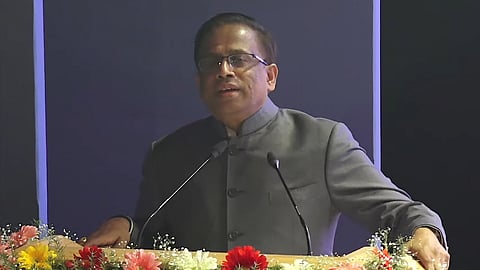
- Latest Legal News
- News
- Dealstreet
- Viewpoint
- Columns
- Interviews
- Law School
- Legal Jobs
- हिंदी
- ಕನ್ನಡ

Supreme Court Justice KV Viswanathan on Friday said that the presence of retired judges in India's pool of arbitrators is a source of comfort and confidence for stakeholders who look to India as a potential seat of arbitration.
In his keynote address at India ADR Week 2025, Justice Viswanathan said that the availability of a deep and diverse pool of arbitration talent or the human capital advantage, is one of the our biggest strengths.
This was in stark contrast to the stance taken by Senior Advocate and King's Counsel Harish Salve at the same conference two days ago when he said that arbitral tribunals headed by retired judges undermine credibility and public trust.
Justice Viswanathan contradicted the same and opined that by bringing their judicial temperament and legal acumen, retired judges working as arbitrators only strengthen public confidence in ADR.
"Our arbitration roster is significantly bolstered by the presence of retired judges of the Supreme Court and various High Courts bringing to the table decades of adjudicated experience, a sound knowledge of law and most importantly, an established reputation for fairness, impartiality and procedural rigour. Whichever side of the bar you belong, whichever stakeholder you are in the arbitration, I think there is nothing more satisfying than having your case heard before a judicially trained mind who is seasoned as a judge with a judicial temperament, known for his knowledge of law and of course known for his integrity. I think that is the most significant assurance a stakeholder in an arbitration can have. Their involvement instils deep confidence in both domestic and international parties," he said.
Justice Viswanathan also highlighted India's cost competitiveness as another advantage. With arbitration costs escalating globally, India can be an attractive arbitration destination for parties, especially those from emerging economies, who might find other hubs prohibitively priced.
"This strategic advantage makes India a preferred venue for a broad spectrum of commercial entities, including MSMEs and state-owned entities, allowing them to engage in high-quality dispute resolution without facing prohibited expenses," he added.
The third edge India has is its robust technological infrastructure and digital readiness, Justice Viswanathan said,
The Supreme Court judge highlighted the judiciary's proactive embrace of technology, especially in the years following the COVID-19 pandemic. The adoption of technology at the highest levels of India's judiciary translates seamlessly into arbitration, he said.
"The concept of seamless virtual units, hybrid proceedings and secure digital case management is no longer aspirational in India; it is a standard everyday practice. This familiarity translates seamlessly into arbitration proceedings, fostering an environment where technological integration is not merely tolerated, but actively encouraged and efficiently managed," he explained.
Justice Viswanathan also highlighted India's common law heritage and evolving pro-arbitration legal jurisprudence as features that provide an inherently familiar and reliable legal environment. This offers significant comfort and assurance to international parties, particularly those from other common law jurisdictions.
The most crucial of our assets is the inclusivity and integrity that is built into the foundations of the system, he further stated.
"Underpinning India's arbitration proposition are two fundamental pillars that form its very soul, inclusivity and integrity. India's pluralistic society and rich cultural capacity are not challenges to be managed. They are strategic assets that enhance its appeal as a premier arbitration destination. This Indian ability to accommodate a breath-taking diversity of perspectives is invaluable in resolving cross-border disputes, where understanding cultural nuance can be as important as understanding a liberal nuance," he said.
While concluding his address, Justice Viswanathan underscored the synergy between the judiciary, executive, and legislature, that lies behind the progress India has made in fostering ADR.
"The legislature has provided steadfast backing through progressive, thoughtful amendments, responding to the needs of the time. The judiciary has played a transformative role through enlightened interpretation, rectifying past abominations, and championing the philosophy of minimal interference and maximal support. The executive has facilitated the evolution by supporting the development of world-class infrastructure and enabling a conducive environment for both physical and digital arbitration," Justice Viswanathan explained.
Senior Advocate Nakul Dewan in his closing remarks at ADR Week echoed Justice Viswanathan's sentiments, saying that the capacity of India's pool of arbitrators is exponential now.
"Indian arbitrators now are being sought for and appointed not just in India-related matters, but in non-India-related matters which are seated across the board," he said.
He also highlighted the work done by the Mumbai Centre For International Arbitration (MCIA) to develop India's arbitration sector.
"MCIA is literally looking at putting the Indian arbitration ecosystem on par with any other institution would in the world. 91% of the awards have been delivered in 18 months or less. To date, not a single award has been set aside, which again gives kudos to the arbitrators, as well as to the judiciary where these awards have been challenged. And there have been no costs overrun, which means that parties have been able to finish their arbitration knowing fully well what their scale of costs is," Dewan said.
He added that 34 percent of the arbitrators appointed by MCIA so far have been women which is at par with the Singapore International Arbitration Centre (SIAC) and the International Court of Arbitration (ICC).